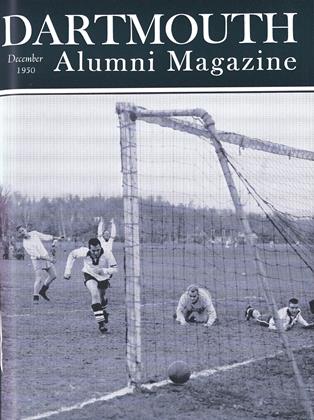Named armed services traffic manager for the U. S. Department of Defense, E. Grosvenor Plowman '20 brings to this important assignment a well tested experience in moving "persons and things" by rail, water and air—experience which was preceded by years of study.
He is the nation's first director of the new Military Traffic Service, created last August to unify transportation responsibilities within the branches and agencies of the Department of Defense. As stated in the official memorandum, the purpose of MTS is "to provide, under one authority, efficient and economical traffic management for the movement within the continental United States of persons and things for all agencies or departments of the Department of Defense, subject to the policies of the Joint Chiefs of Staff and the Munitions Board."
Besides supervising his own staff, Mr. Plowman will preside as chairman over an Advisory Council, within MTS, consisting of a member and his deputy from each Military Department, and from the Munitions Board.
To accept his new post Mr. Plowman was released on a loan basis from his position as vice president in charge of traffic for the United States Steel Corporation of Delaware, where he has been since 1944. He formerly worked for the Colorado Fuel and Iron Corporation as traffic manager, joining this company in 1937.
Nearly 17 years of teaching and research preceded his full-time career in the special field of traffic management in industry. After taking graduate work at Harvard Business School and Boston University, Mr. Plowman received his M.S. from the University of Denver and his Ph.D. from the University of Chicago School of Business in 1937. Combining teaching with study, he taught economics at M.I.T. and later at Boston University. While serving on the staff of Babson Institute he became, in 1924, Industrial Sec- retary of Associated Industries of Massachusetts. At the University of Denver he was made Director of the Research Bureau and was Professor of Business Management. He is vice president and a founder member of the American Society of Traffic and Transportation; with Elmore Petersen he wrote Business Organization andManagement in 1941. During the war Mr. Plowman served as transportation consultant to the chairman of The War Production Board.
Weighing the respective importance of civilian and military movements is one of the many difficult judgments involved in defense traffic management. Press and official comment has been enthusiastic over the appointment of Mr. Plowman, whose pioneering energy and expert accomplishment have won him the confidence of both industry and government.
EDWARD S. PLOWMAN '2O
 View Full Issue
View Full Issue
More From This Issue
-
 Class Notes
Class Notes1918
December 1950 By ERNEST H. EARLEY, DONALD L. BARR, RICHARD A. HOLTON -
 Class Notes
Class Notes1935
December 1950 By HENRY R. BANKART JR., JOHN WALLACE, ROBERT w. NARAMORE -
 Class Notes
Class Notes1942
December 1950 By JAMES L. FARLEY, JOHN H. HARRIMAN, ADDISON L. WINSHIP II -
 Class Notes
Class Notes1923
December 1950 By TRUMAN T. METZEL, COLIN C. STEWART 3RD, LEON H. YOUNG JR -
 Class Notes
Class Notes1934
December 1950 By JOHN J. FOLEY, JOHN E. GILBERT, WILLIAM H. SCHERMAN -
 Article
ArticleContributions by Classes in the 1950 Alumni Fund Campaign
December 1950







